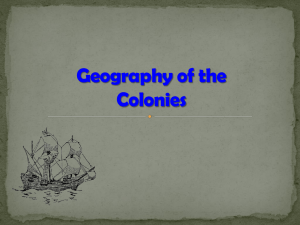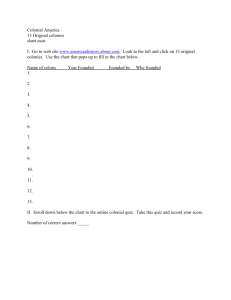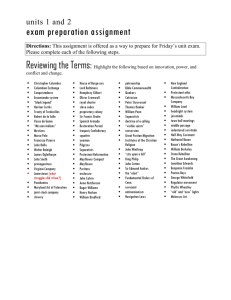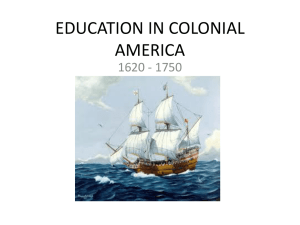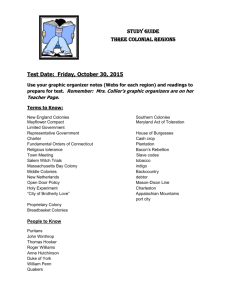AP US History summer assignmnets 2012
advertisement
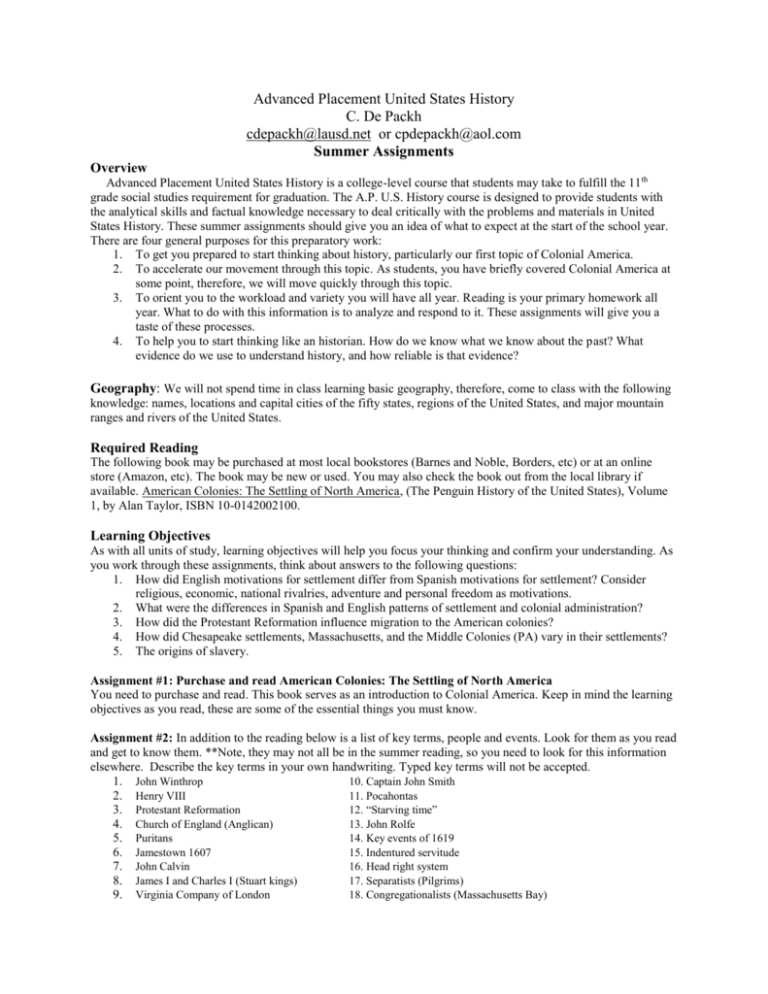
Advanced Placement United States History C. De Packh cdepackh@lausd.net or cpdepackh@aol.com Summer Assignments Overview Advanced Placement United States History is a college-level course that students may take to fulfill the 11th grade social studies requirement for graduation. The A.P. U.S. History course is designed to provide students with the analytical skills and factual knowledge necessary to deal critically with the problems and materials in United States History. These summer assignments should give you an idea of what to expect at the start of the school year. There are four general purposes for this preparatory work: 1. To get you prepared to start thinking about history, particularly our first topic of Colonial America. 2. To accelerate our movement through this topic. As students, you have briefly covered Colonial America at some point, therefore, we will move quickly through this topic. 3. To orient you to the workload and variety you will have all year. Reading is your primary homework all year. What to do with this information is to analyze and respond to it. These assignments will give you a taste of these processes. 4. To help you to start thinking like an historian. How do we know what we know about the past? What evidence do we use to understand history, and how reliable is that evidence? Geography: We will not spend time in class learning basic geography, therefore, come to class with the following knowledge: names, locations and capital cities of the fifty states, regions of the United States, and major mountain ranges and rivers of the United States. Required Reading The following book may be purchased at most local bookstores (Barnes and Noble, Borders, etc) or at an online store (Amazon, etc). The book may be new or used. You may also check the book out from the local library if available. American Colonies: The Settling of North America, (The Penguin History of the United States), Volume 1, by Alan Taylor, ISBN 10-0142002100. Learning Objectives As with all units of study, learning objectives will help you focus your thinking and confirm your understanding. As you work through these assignments, think about answers to the following questions: 1. How did English motivations for settlement differ from Spanish motivations for settlement? Consider religious, economic, national rivalries, adventure and personal freedom as motivations. 2. What were the differences in Spanish and English patterns of settlement and colonial administration? 3. How did the Protestant Reformation influence migration to the American colonies? 4. How did Chesapeake settlements, Massachusetts, and the Middle Colonies (PA) vary in their settlements? 5. The origins of slavery. Assignment #1: Purchase and read American Colonies: The Settling of North America You need to purchase and read. This book serves as an introduction to Colonial America. Keep in mind the learning objectives as you read, these are some of the essential things you must know. Assignment #2: In addition to the reading below is a list of key terms, people and events. Look for them as you read and get to know them. **Note, they may not all be in the summer reading, so you need to look for this information elsewhere. Describe the key terms in your own handwriting. Typed key terms will not be accepted. 1. John Winthrop 10. Captain John Smith 2. Henry VIII 11. Pocahontas 3. Protestant Reformation 12. “Starving time” 4. Church of England (Anglican) 13. John Rolfe 5. Puritans 14. Key events of 1619 6. Jamestown 1607 15. Indentured servitude 7. John Calvin 16. Head right system 8. James I and Charles I (Stuart kings) 17. Separatists (Pilgrims) 9. Virginia Company of London 18. Congregationalists (Massachusetts Bay) 19. Plymouth 1620 20. Mayflower Compact 21. William Bradford 22. Massachusetts Bay Colony 23. “City Upon a Hill” 24. Roger Williams 25. Anne Hutchinson 26. Covenant of grace vs. covenant of works 27. Dutch West India Company 28. New Netherlands, New Amsterdam 29. William Penn 30. Middle Passage 31. Bacon’s Rebellion 1676 32. Half-way covenant 33. Mercantilism 34. Navigations Acts-1651, 1660, 1663, 1673 35. Lords of Trade and Plantations (Board of Trade) 36. Triangular Trade 37 Dominion of New England 38. Regulators and Paxton Boys 39. Jonathan Edwards 40. George Whitefield 41. New Lights vs. Old Lights 42. Great Awakening 43. Seven’s Years War (French and Indian War) 44. Salutory (benign) Neglect 45. Albany Congress 46. Proclamation Line of 1763 Assignment #3: After you have read the book, it is time to do some writing. Read all the directions to the writing assignment below Boats-R-Us-Colonial Relocation Services, Inc. Lucky You! You are a relocation agent for Boats-R-Us Colonial Relocation Services, operating out of the home office in London, England. The Company has recently sent you on a long, long (1607-1740 approximately) scouting trip to the American colonies. You have just returned to London and your favorite client, Lord Walker, has requested that you write him about your experiences in one of the colonies since he plans on taking up residence in the New World for a few generations. He has selected three areas to choose from: Chesapeake, Virginia, Massachusetts, or Pennsylvania. Do not be overly concerned about the time frame of this letter, it may be as broad as you need (within the rough confines of 16070-1740) .Although your client is a wise and enterprising young man, he needs your assistance in picking a place to call home. Your letter is intended to help Lord Walker make a decision. As a professional, you are concerned about his future happiness so you should be careful to warn him about some of the pitfalls of relocation to the selected destination. You may want to share some advise on achieving political and personal success, as well as describe or advise him on the Physical geography Types of people in the colony Social structure Key colonial leaders Economic pursuits/opportunities Religious climate Organization of colony (towns, etc) Hardships, problems All the background you should need is contained in the pages you have read. You may also use other outside sources. Be creative, have fun, but be accurate and use the book you have read. All assignments are due by the end of the second week of the semester. August 24.


